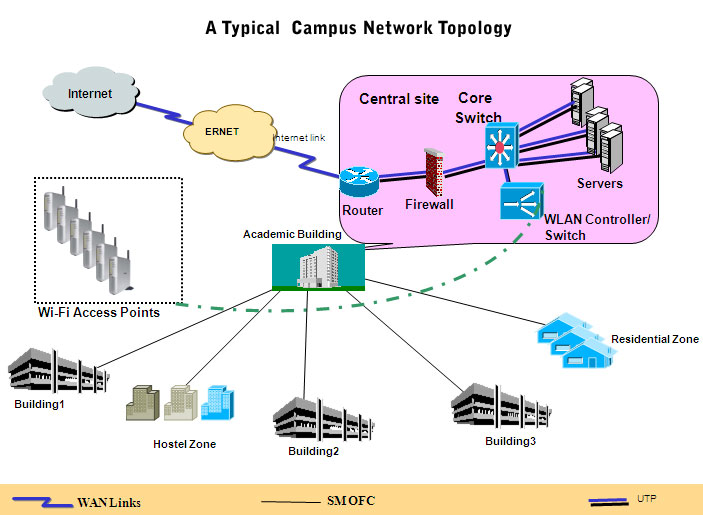Campus Wide Networking
The institutions of higher learning need to reap the benefits of internet revolution through integrating ICT into the learning environment. The focus is to improve the quality of education and laying a good foundation at the higher learning institution and encourage the institution and its affiliated colleges to share the resources, knowledge content, promotion and implementation of e-governance, faculty development and exchange of skills. All the IT resources and content should be available to the faculty and students from their desk as well as anywhere-anytime basis over the campus. To achieve the same, the universities/colleges/institutions need to establish Campus network at their campuses. It is very helpful for the universities/colleges and institutions to work from any block/building and receive the same speed of data transfer.
A typical campus network or campus area network is a computer network made up of an interconnection of local area networks (LANs) within a limited geographical area. The networking equipments (switches, routers, firewalls, IPSs) and transmission media (optical fiber, copper cable) are used to interconnect & communicate among all devices connected.

In a college or university/institution, its campus area network is likely to interconnect a variety of campus buildings, including administrative buildings, academic buildings, university libraries, campus or student centers, hostels, guest house, gymnasiums, and other outlying structures, like conference centers, technology centers, stadiums, and training institutes.
Campus networks are interconnected with high speed Ethernet links operating over optical fiber such as Gigabit Ethernet and 10 Gigabit Ethernet. Tiered hierarchal architecture is used to establish Campus network with core, distribution & access segments for efficient flow of information & data traffic. All buildings, blocks, centers, hostels, residential complex, hostels are connected through high speed fiber optical cable and all nodes inside a building are connected through UTP copper cable support gigabits speed. Seminar halls, conference rooms and common areas in the campus are wi-fi enabled through deployment of secured 802.11 based wireless access points with centralized authentication to allow secure network access through laptops and wi-fi enabled devices. Internet & all applications/services are deployed at central locations from where faculty, staff and students access them using their desktops & laptops anytime from anywhere in the campus.

